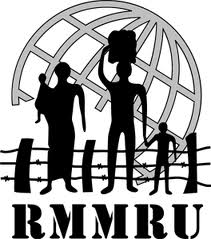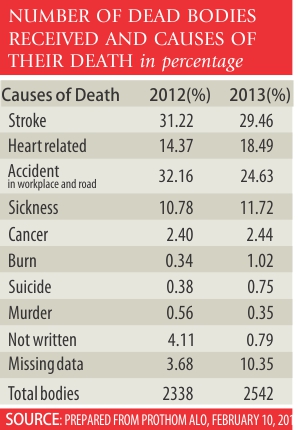Premature death: Uncalculated cost of migration
Tasneem Siddiqui
Recently, Shariful Islam, a journalist of Prothom Alowrote an insightful piece on death of Bangladeshi migrants in the countries of destination. The figures are baffling and certainly require to be factored in the cost-benefit analysis of labour migration. Unnatural or premature death of migrant workers is definitely an important social cost of migration borne by the migrant, his/her family, the community and the nation.
The article noted that in the last six years 13,827 bodies of deceased migrants were sent to Bangladesh, averaging around 2,300 per year. 84.28% came from labour receiving countries. Saudi Arabia was the largest source country with 30.44% of the total dead bodies sent, followed by Malaysia (16.83%) and UAE (14.46%). Of course, the total figure of deceased Bangladeshi nationals in these countries should be higher than the above figures. A section of the deceased, particularly those who had irregular status, may get buried in the countries of destination for lack of identification and if there is no one to claim the bodies. On the other hand, some of the deceased may not be migrants. It is not known if the writer had adjusted the figure of deceased pilgrims with the total numbers cited in case of Saudi Arabia.
There were newspaper reports on deceased migrants in the past as well. Such reports never resulted in thorough investigation of the reasons for their death. Rather, policy makers and government functionaries tried to underplay the importance of such news by saying “these are natural deaths” and “the death rate of migrants is not more than national average.” Such response hardly took into consideration the ages of the migrants. The report mentioned 38 years as the average age of the deceased whereas life expectancy of the average Bangladeshi is 70.36 years. Besides, migrants are able bodied persons who go through all kinds of health tests before they are accepted in those countries. Such quick explanation by the authorities and lack of interest in finding the real cause of deaths undermines the scope for improving work, health and living conditions of migrants in the countries of destination.
The table presents the reasons stated in the death certificates of the deceased persons. A small percentage of them could be termed as natural death. Last year, 29.46% and 18.49% were due to stroke and cardiac failure, respectively. Why would such large number of migrants suffer from stroke and cardiac failure? There may be several explanations for this. Over the last 10-15 years more and more migrants are going abroad on free visas. A significant number of them also go on Hajj or tourist visa and stay back as irregular migrants. Those who migrate on free visa do not have a particular kafeel or employer to work under. It is the influential persons of receiving countries who sell free visas, and individuals who are entitled to bring in workers under domestic work visa also sell the permits to local outsourcing or cleaning companies.
These companies or individuals house the migrants in unhygienic camps, in many cases under lock and key. Those workers do not have regular jobs. Rather they are picked from the camps early in the morning and taken to different worksites for doing irregular jobs, such as cleaning date trees and toilets of schools and other institutions. At the end of the day, they are collected together and taken to their camps late in the evening. They eat whatever is available at their work sites. Access to safe drinking water is an issue of concern. The migrants suffer the most from waterborne diseases, jaundice being the most important, along with skin disease and respiratory problems. Many migrants are affected by dehydration and sunstroke as they are not informed about the need to drink plenty of water. Should we term deaths in such situations as “natural death” or do they merit to be termed as “murder”?
The table shows that as many as 32.16% in 2012, and 24.63% in 2013, of the deaths were due to accidents in workplaces and roads. An awareness campaign on traffic rules of receiving countries may reduce the accident related death toll manifold. Civil society bodies try to provide such information before departure. However, national media, particularly electronic, do not run any public service announcement on dos and don'ts in the countries of destination. Private TV channels make huge profits by organising real time viewing and cultural programmes in many destination cities, including Doha, Sharjah, Kuala Lumpur and Dubai. Migrant workers are their principal audience. However, they do not have even ten second slots for giving information to these poor migrants.
One has to accept that unnatural death is a major social cost of migration. We cannot remain indifferent to it. Thorough research needs to be conducted to identify the causes of such deaths. The government and the civil society should try to place this issue before the UN High Level Dialogue on migration or during the discussions of Global Forum on Migration and Development (GFMD). Business ethics demands that print and electronic media initiate social dialogue and invest real air time for providing basic safety information to the migrants.
The writer is Professor of Political Science and Founding Chair, RMMRU, University of Dhaka.
Published: The Daily Star Monday, February 17, 2014




